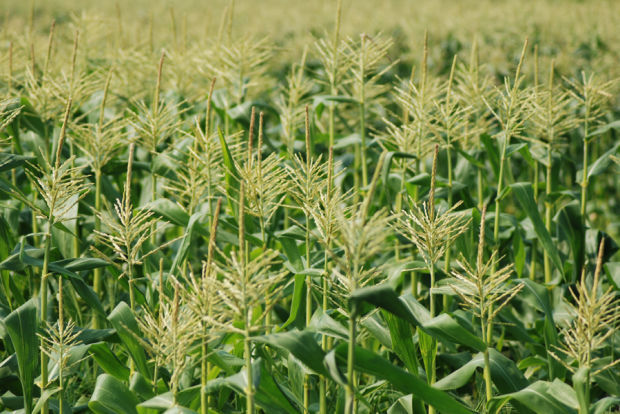LIHUE — It’s a fiery, often emotional, issue in Hawaii. And one organization plans to spend big bucks in an attempt to sway public opinion. “Agriculture in Hawaii is presently under attack,” the Hawaii Farm Bureau Federation said. In response,
LIHUE — It’s a fiery, often emotional, issue in Hawaii. And one organization plans to spend big bucks in an attempt to sway public opinion.
“Agriculture in Hawaii is presently under attack,” the Hawaii Farm Bureau Federation said.
In response, HFBF will spend $400,000 per year on a new “comprehensive public relations campaign intended to win the hearts and minds of voters and shore up support for all agricultural producers,” it stated in an Aug. 21 letter written by HFBF President Chris Manfredi.
The letter and a seven-page confidential document outlining the Small Farmers, Big Stories Public Relations Campaign were published Friday by the Honolulu-based Civil Beat.
“Across the nation, farmers and ranchers have been caught off guard by extremist activists that will stop at nothing to realize their utopian, misinformed and unsustainable vision of how you should farm … Please join us in thwarting these efforts by countering with positive fact-based messages before you find yourself fighting these same issues in your communities,” Manfredi wrote.
The campaign, according to the document, will consist of targeted messages in print, electronic and social media and utilize guerrilla marketing techniques, including strategically timed letters to the editor and online comments in articles, temporary tattoos divvied out during events and school presentations, and customized face painting for children.
In addition to regular advertisements planned in all major Hawaii newspapers, including The Garden Island, HFBF’s plan calls for 30-second ads highlighting “agricultural heroes” during NFL and college football games, PGA golf, and primetime TV shows like “CSI,” “Hawaii 5-0,” “Big Bang Theory” and “60 Minutes.”
It is unclear how much of the money will be spent on Kauai, where lawmakers introduced and passed a measure aimed at regulating the island’s biotech industry, only to have the industry file suit in U.S. District Court. Last week, a federal judge ruled that the Kauai law is pre-empted by state law and therefore invalid.
Laurie Ho, the new president of the Kauai County Farm Bureau, said HFBF is still in the fundraising phase of the project and that the campaign has not yet been launched.
“It truly is a pro-agriculture campaign,” she said, adding it goes far beyond the controversies surrounding GMOs.
Ho declined to comment further, as the campaign is being spearheaded by HFBF. Manfredi did not respond to emails and phone calls seeking comment Tuesday.
Councilman Gary Hooser, who introduced Ordinance 960 (formerly Bill 2491)— which sought to regulate pesticide use and genetically modified crops by the island’s largest companies — said the campaign could have been expected.
“The fact that the largest landowners are partnering up with the large chemical companies trying to influence public opinion leading up to the election is not surprising,” he said.
Mark Phillipson, a spokesman for Syngenta on Kauai, said he was unaware of HFBF’s upcoming campaign but supports it.
“The farm bureau is doing what they should be doing, and that’s representing all forms of agriculture and defending all of them,” he said. “We need all the tools in the toolbox to make this thing work. That’s how agriculture’s always worked. Farming, ranching — it’s always been integrated in all forms.”
As part of the campaign, HFBF also hopes to restore Ag Hawaii, a quarterly magazine last published in September of 2012, revamp the HFBF website and increase its presence on Facebook, Twitter and Instagram.
HFBF wrote in its strategy overview that while working farmers and ranchers of Hawaii were busy growing crops and feeding families, contributing to the economy and their communities, non-farmers who are unfriendly toward modern agriculture have waged a campaign of political and environmental activism.
Success by such activists, HFBF said, would “cause the collapse of agriculture in Hawaii and have reaching impacts beyond our shores.”
The campaign is important, according to HFBF, because Hawaii’s tropical climate enables researchers and producers to test and develop trails and produce products up to four times faster than on the Mainland.
“What’s more, legislation that recently passed in Hawaii could be precedent-setting for other communities across the country,” the organization wrote. “Recent gains made by activist forces empower their cause. Legal and financial resources quickly pour in to fuel the fight against farmers.”
HFBF says farmers have been widely outnumbered in public testimony regarding legislation around the state, including measures on Kauai, Maui and Big Island.
“They comprise only about 1 (percent) of the population while growing food for the other 99 (percent),” the bureau wrote.
Chris D’Angelo, environment writer, can be reached at 245-0441 or cdangelo@thegardenisland.com.


